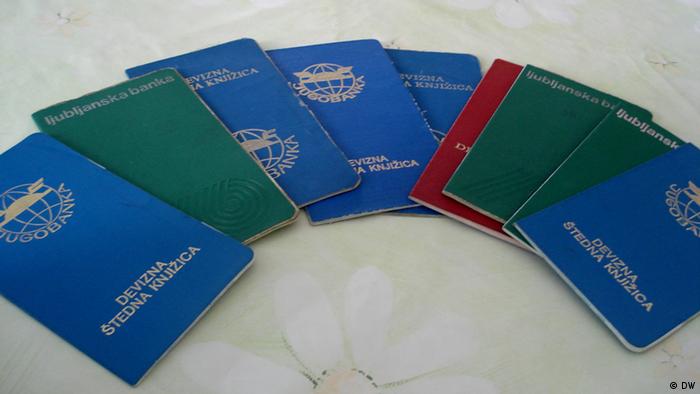After working for years in Germany, hundreds of thousands of people from the former Yugoslavia have seen their savings go up in smoke. Despite a European court's ruling, banks aren't willing to pay out the old deposits.
Safet Alimehaj is not alone. He has passbooks from savings accounts he inherited from his parents but a slim chance of ever seeing the money deposited into them.
Alimehaj's parents were Yugoslav "guest workers" who traveled to Germany in the 1970s as part of a program to bring non-German workers to the country temporarily. They transferred their savings from a bank in the southern German city of Neu-Ulm to Ljubljanska Banka (LB) in what is now Slovenia. After the break-up of Yugoslavia, the bank's assets were taken over by the Nova Ljubljanska Banka (NLB), which does not regard itself as LB's legal successor.
Thousands affected
 Mattil said billions of euros could potentially be paid out
Mattil said billions of euros could potentially be paid out
In Germany alone there are about 300,000 people with ties to the former Yugoslavia suffering the same fate as Alimehaj, according to Munich lawyer Peter Mattil, whose firm represents people in such circumstances who have become German citizens.
"These people made deposits into their savings accounts for years - or even decades," he said. "Then in 1994, the successor bank was founded and it took over all the assets, but none of the liabilities associated with the accounts created outside of the country."
That the bank was able to do so with the blessing of the Slovenian state, despite the government guaranteeing savings accounts, was a crime that needs redress, Mattil added.
In the 1970s, there were about 600,000 Yugoslav guest workers in Germany, and they were a sought-after clientele.
"Ljubljanska Bank actively targeted them with interest rates of up to 12 percent," Mattil said.
"Ljubljanska Bank actively targeted them with interest rates of up to 12 percent," Mattil said.
Five other banks acted in a similar manner, leaving the so-called guest workers in Germany as well as Austria, France, Switzerland and Sweden holding worthless papers after changes to the banking system in the former Yugoslavia. Many of the workers saw their cases rejected by courts at home.
European court rules for workers
A small group of those affected brought their case to the European Court of Human Rights (ECHR) in 2008 after exhausting the appeal processes in their home countries. Earlier this month, Judges at the Strasbourg-based court ruled in favor of three people affected and said their savings should be returned along with that of "everyone else in the same situation." The court also said those affected should receive interest on their savings and 4,000 euros ($5,200) per person in compensation for personal suffering.
 The ECHR's ruling will influence future judgments, Mattil said
The ECHR's ruling will influence future judgments, Mattil said
That would add up to tens of billions of euros that banks or states would have to pay out in returns and compensation as many guest workers had saved sums of 100,000 euros or more, according to Mattil.
But several hurdles remain for Alimehaj and others like him as the ECHR ruling had no direct effect. While the court can establish that a person's human rights were abused, it cannot force a state to take action to address the wrong, according to law professor Peter Baumeister of the SRH University in Heidelberg. Even if a German court were to rule in favor of Alimehaj or another holder of a savings account based on the ECHR's ruling, it would not ensure the judgment is enforced, he added.
Slovenia can also appeal the ECHR's decision, which the country has already announced it will do, according to Mattil.
Still, Mattil said he remains optimistic that the court's decision will help his clients' cases.
"This is not just some theoretical or philosophical ruling," he said. "It needs to be heeded and will form the basis of future judgments."
Baumeister, however, took a less optimistic view of the situation, saying, "I think that this ruling can be a source of hope but not of euphoria."
While there will certainly be additional court cases and rulings, whether the guest workers or their children ever get the money they saved in the certificates of deposits remains an open question. dw de


No comments:
Post a Comment